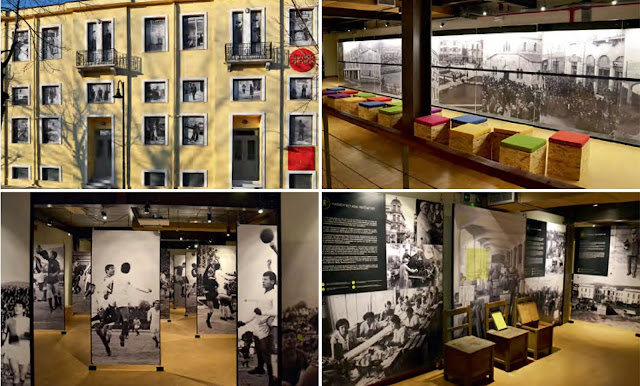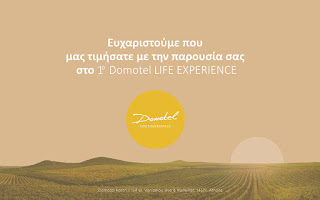CONCIERGE VOLOS/ ΒΟΛΟΣ | Εκθεματα οι ζωες των ανθρωπων Human narratives on display
CONCIERGE
VOLOS/ ΒΟΛΟΣ
Εκθέματα οι ζωές των ανθρώπων
Human narratives on display
Σε μια παλιά καπναποθήκη, τυπικό δείγμα βιομηχανικ ής αρχιτεκτονικής, το Μουσείο Πόλης αφηγείται τη σύγχρονη ιστορία του Βόλου.
The City Museum, housed in a former tobacco warehouse, tells the town’s stor y in the most eloquent way (scroll down for the full english text)
Κείμενο/ Text: Κωστής Ζαφειράκης/ Kostis Zafeirakis
1η δημοσίευση/ 1st published: Domotelling magazine 10/2016
VOLOS/ ΒΟΛΟΣ
Εκθέματα οι ζωές των ανθρώπων
Human narratives on display
Σε μια παλιά καπναποθήκη, τυπικό δείγμα βιομηχανικ ής αρχιτεκτονικής, το Μουσείο Πόλης αφηγείται τη σύγχρονη ιστορία του Βόλου.
The City Museum, housed in a former tobacco warehouse, tells the town’s stor y in the most eloquent way (scroll down for the full english text)
Κείμενο/ Text: Κωστής Ζαφειράκης/ Kostis Zafeirakis
1η δημοσίευση/ 1st published: Domotelling magazine 10/2016
Η επανάχρηση παλιών βιομηχανικών κτιρίων είναι το αστικό προβάδισμα του Βόλου. Στην καπναποθήκη Παπάντου στεγάζεται από τον Δεκέμβριο του 2014 το Μουσείο Πόλης, μοναδικό για τη μουσειακή αντίληψη στην Ελλάδα, που φιλοδοξεί να ανιχνεύσει τη σύγχρονη ιστορία μέσα από τους ανθρώπους και τις δραστηριότητές τους. Η πρώτη μεγάλη περιοδική έκθεση του μουσείου έχει τίτλο: «Βόλος – Νέα Ιωνία: τόσο μακριά, τόσο κοντά». Είναι αφιερωμένη στη συμβολή των Μικρασιατών προσφύγων στη διαμόρφωση του βολιώτικου πολιτισμού. Μέσα από ένα πλούσιο οπτικό και ηχητικό υλικό, σπάνια αρχεία και ντοκουμέντα ταξιδεύουμε 90 χρόνια πριν, βλέπουμε τους ντόπιους να δραστηριοποιούνται στο κέντρο της πόλης, τους πρόσφυγες να ιδρύουν τον συνοικισμό στη Νέα Ιωνία και ανάμεσά τους να ρέει ο ποταμός Κραυσίδωνας – σύνορο φτιαγμένο από τη φύση. Σύμβολο της αντιπαλότητάς τους, το ποδόσφαιρο. Η Νίκη και ο Ολυμπιακός, προαιώνιοι αντίπαλοι, με τα μπλε και τα κόκκινα σύμβολα, να κονταροχτυπιούνται μονίμως στα ονομαστά κυριακάτικα ματς. Ακούμε μαρτυρίες ανθρώπων και μικροϊστορίες που μοιάζουν μυθιστορηματικές. Οι καθημερινές ασχολίες, οιεργασιακές συνθήκες, τα καπνομάγαζα, το λιμάνι, οι βιομηχανίες. Κι από την άλλη πλευρά, οι προσφυγικοί συνοικισμοί, ο ιδιωτικός και δημόσιος βίος, οι συνήθειες, η διασκέδασή τους, τα τσιπουράδικα, τα νυχτερινά μαγαζιά, τα σινεμά, οι μουσικές τους. Το ραδιόφωνο μέσα στο μουσείο παίζει μικρασιάτικα και ρεμπέτικα τραγουδισμένα από τους Μιλάνους, δύο αδέλφια που έγραψαν ιστορία με το ουζερί τους, τη θρυλική Σκάλα του Μιλάνου.
Κι ύστερα η πόλη, τα νεοκλασικά σπίτια της που ρήμαξαν οι σεισμοί από το 1954 έως το 1957 και έπειτα η μεγάλη πλημμύρα του 1955, που σχεδόν ισοπέδωσε τον Βόλο, και πολύ αργότερα, τη δεκαετία του ’80, το μεγάλο πλήγμα της αποβιομηχάνισης. Και πάλι η αναγέννηση, που έφερε μαζί της το πιλοτικό πρόγραμμα επανάχρησης των βιομηχανικών αρχιτεκτονικών θησαυρών. Σ’ ένα απ’ αυτά τα άδεια παλιά κελύφη στεγάζεται το Μουσείο Πόλης, όπου αποτυπώνεται με εξαιρετικό τρόπο το αφήγημα του σύγχρονου Βόλου.
Info: Το Μουσείο Πόλης βρίσκεται στην οδό Φερών 17 και λειτουργεί Τρίτη-Κυριακή 10.30-13.30, Τετάρτη και Παρασκευή 18.00-21.00. Η είσοδος είναι δωρεάν. Ε-mail: museums@doepap.gr, τηλ. 24210-29878
When it comes to the reuse of old industrial buildings, Volos is at the forefront of the movement. Since December 2014, the former Papantos tobacco warehouse has been home to what is in Greece a unique approach to museums, namely a city museum, which aspires to trace contemporary history through the lives of ordinary people and their activities.
The museum’s first major temporary exhibition is titled “Volos – Nea Ionia: so close and yet so far.” It is dedicated to the contribution of Asia Minor refugees to the city’s rich cultural life. A wealth of fascinating audio and visual materials, documents and other archival objects takes visitors 90 years back in time, where they can “see” locals in the city center of Volos, refugees establishing the settlement at Nea Ionia, and between them, the natural border of the Krafsidonas River. The rivalry between the two groups is reflected by the city’s two biggest soccer clubs, Niki Volos and Olympiakos Volos, the blues and the reds; two longstanding adversaries who have competed with a passion in thrilling Sunday matches over the decades.
Visitors will also hear people’s real stories, which are powerful narratives of their daily lives and the working conditions at tobacco workshops, the port and the factories. They’ll find out about the refugee settlement, too, and the private and public life there, as well as about how people socialized and had fun; the tsipouro bars, the nightclubs and the cinema.
They will discover the music of Asia Minor and “rebetika” songs from the legendary Milanos brothers, who claimed a place in local history with their renowned taverna, Scala of Milanos. The museum also presents the history of the city of Volos itself, whose neoclassical houses were devastated by earthquakes between 1954 and 1957, not to mention the terrible flood in 1955 which almost destroyed everything in the area, followed much later by the deindustrialization that desolated the city in the 1980s.
The exhibits also cover today’s period of regeneration, as typified by the pilot program for the reuse of the city’s industrial architectural treasures, including the restoration of the very building which now houses the City Museum and tells its story so eloquently.
Info: 17 Feron. Opening hours: Tuesday-Sunday 10:30-13:30, Wednesday & Friday 18:00-21:00. Free admission Ε-mail: museums@doepap.gr. Tel. (+30) 24210.298.78
Explore Domotel Xenia Volos
Explore Domotel Xenia Volos




Comments
Post a Comment